Psychology Case Study: Counseling for Grief and Loss in Bereavement
VerifiedAdded on 2022/09/14
|10
|3083
|11
Case Study
AI Summary
This case study examines the complexities of grief and loss counseling through the lens of a couple, Becca and Howie, who are struggling to cope with the death of their son. The assignment delves into the pressing issues faced by the clients, the therapist's approach to engagement and connection, and the development of a therapeutic plan. It explores theoretical frameworks, such as the Five Stages of Grief, and identifies appropriate interventions, including individual and group therapy. The case study anticipates potential obstacles, such as the client's resistance and psychological issues like PTSD, and outlines strategies to overcome these challenges. Furthermore, it emphasizes the importance of self-care for the therapist. The study concludes with a reflection on the therapeutic process and the role of the therapist in supporting clients through their grief journey, offering valuable insights into the practical application of counseling techniques and the emotional challenges involved.
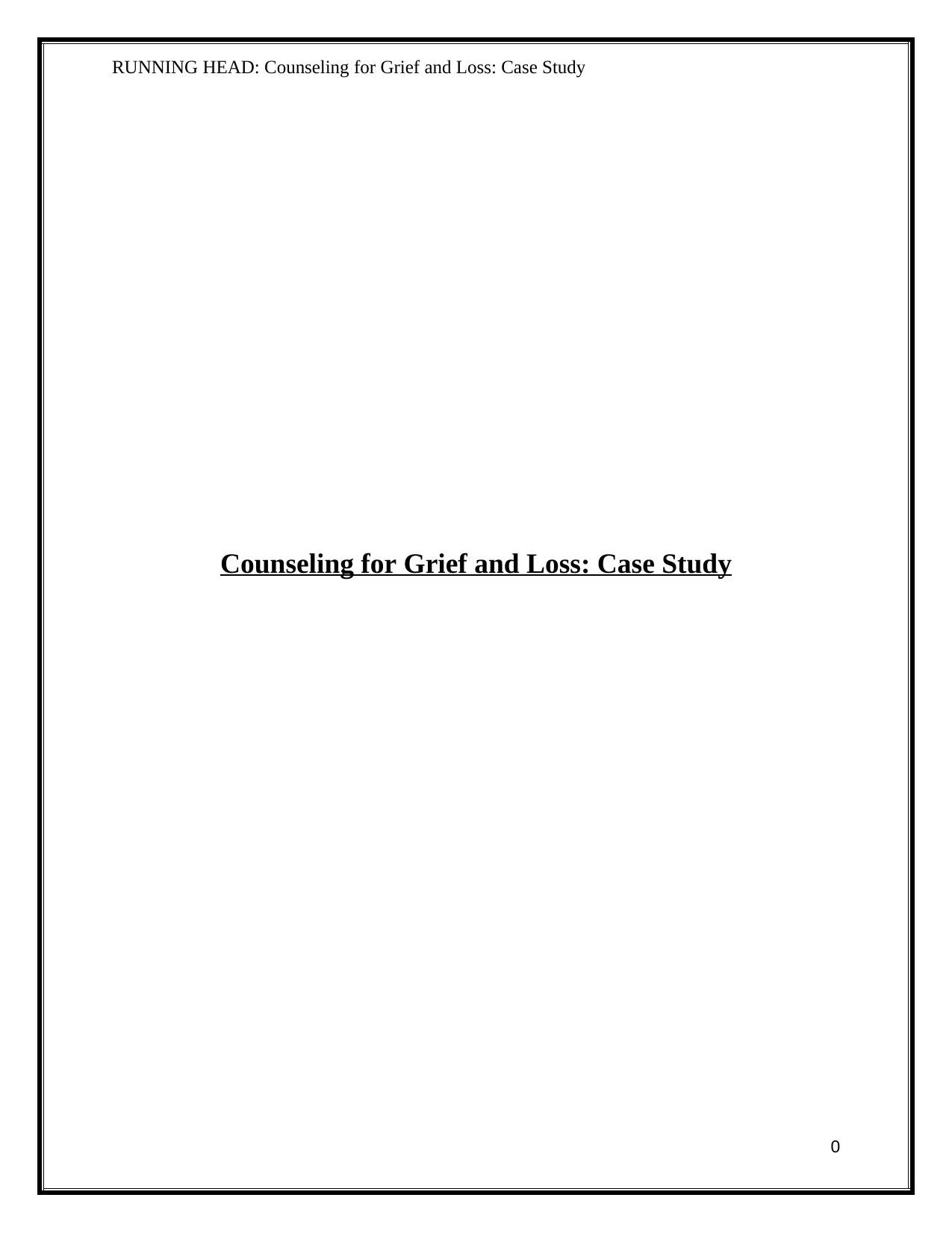
RUNNING HEAD: Counseling for Grief and Loss: Case Study
Counseling for Grief and Loss: Case Study
0
Counseling for Grief and Loss: Case Study
0
Paraphrase This Document
Need a fresh take? Get an instant paraphrase of this document with our AI Paraphraser

Counseling for Grief and Loss: Case Study
Table of Contents
Introduction......................................................................................................................................2
Describe the pressing issue for the client........................................................................................2
Describe how you would engage and connect to this client............................................................2
Explain the thoughts and ideas around contracting and case planning; what are your goals and
objectives for the client and the therapy process.............................................................................3
What theoretical ideas might inform and support your therapeutic process?..................................3
What interventions would you consider using (please provide rationales).....................................4
What obstacles can you anticipate/ might arise?.............................................................................5
How would you work to overcome these?......................................................................................5
What strategies for self
care might you employ?...................................................................................................................6
Conclusion.......................................................................................................................................6
References........................................................................................................................................7
1
Table of Contents
Introduction......................................................................................................................................2
Describe the pressing issue for the client........................................................................................2
Describe how you would engage and connect to this client............................................................2
Explain the thoughts and ideas around contracting and case planning; what are your goals and
objectives for the client and the therapy process.............................................................................3
What theoretical ideas might inform and support your therapeutic process?..................................3
What interventions would you consider using (please provide rationales).....................................4
What obstacles can you anticipate/ might arise?.............................................................................5
How would you work to overcome these?......................................................................................5
What strategies for self
care might you employ?...................................................................................................................6
Conclusion.......................................................................................................................................6
References........................................................................................................................................7
1
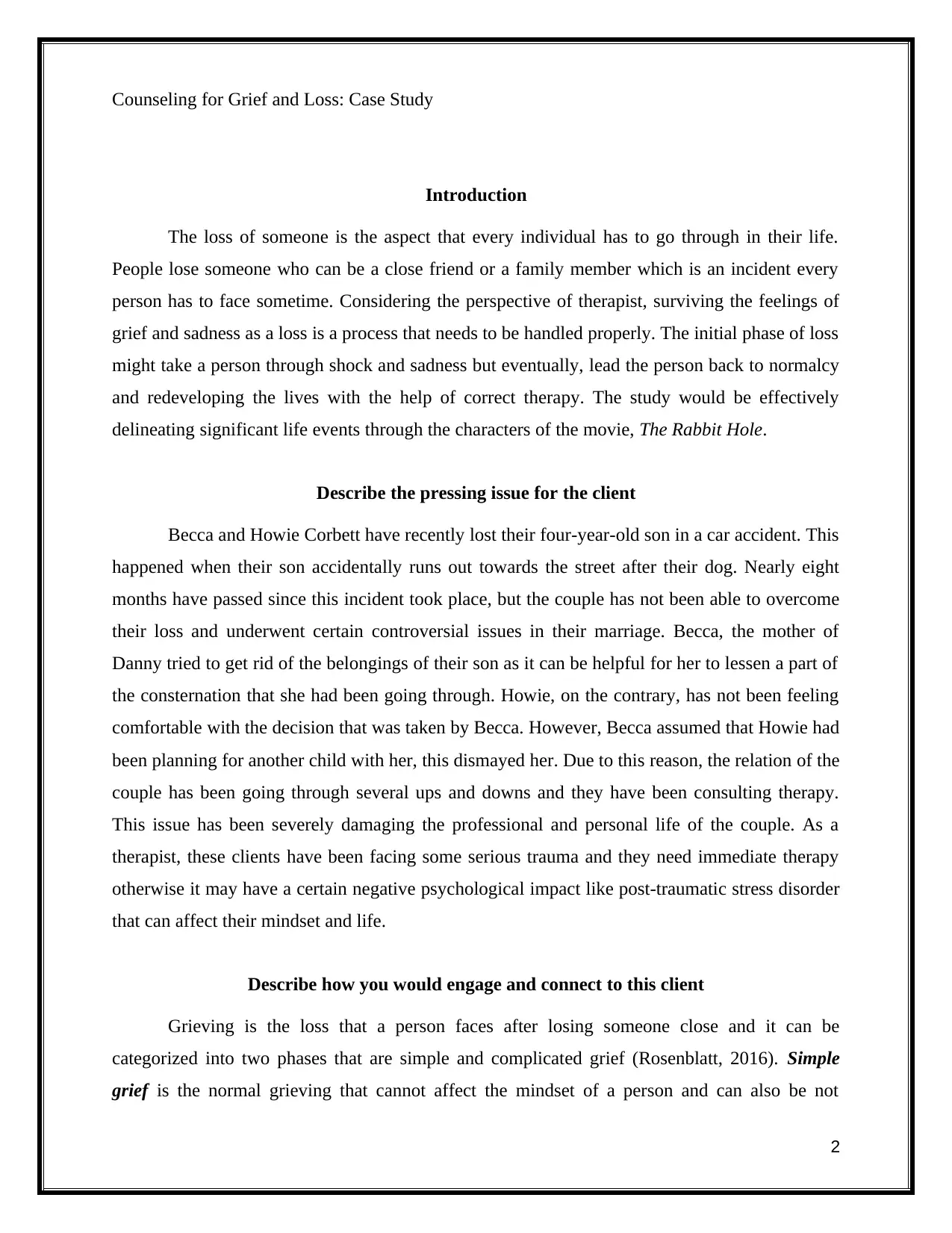
Counseling for Grief and Loss: Case Study
Introduction
The loss of someone is the aspect that every individual has to go through in their life.
People lose someone who can be a close friend or a family member which is an incident every
person has to face sometime. Considering the perspective of therapist, surviving the feelings of
grief and sadness as a loss is a process that needs to be handled properly. The initial phase of loss
might take a person through shock and sadness but eventually, lead the person back to normalcy
and redeveloping the lives with the help of correct therapy. The study would be effectively
delineating significant life events through the characters of the movie, The Rabbit Hole.
Describe the pressing issue for the client
Becca and Howie Corbett have recently lost their four-year-old son in a car accident. This
happened when their son accidentally runs out towards the street after their dog. Nearly eight
months have passed since this incident took place, but the couple has not been able to overcome
their loss and underwent certain controversial issues in their marriage. Becca, the mother of
Danny tried to get rid of the belongings of their son as it can be helpful for her to lessen a part of
the consternation that she had been going through. Howie, on the contrary, has not been feeling
comfortable with the decision that was taken by Becca. However, Becca assumed that Howie had
been planning for another child with her, this dismayed her. Due to this reason, the relation of the
couple has been going through several ups and downs and they have been consulting therapy.
This issue has been severely damaging the professional and personal life of the couple. As a
therapist, these clients have been facing some serious trauma and they need immediate therapy
otherwise it may have a certain negative psychological impact like post-traumatic stress disorder
that can affect their mindset and life.
Describe how you would engage and connect to this client
Grieving is the loss that a person faces after losing someone close and it can be
categorized into two phases that are simple and complicated grief (Rosenblatt, 2016). Simple
grief is the normal grieving that cannot affect the mindset of a person and can also be not
2
Introduction
The loss of someone is the aspect that every individual has to go through in their life.
People lose someone who can be a close friend or a family member which is an incident every
person has to face sometime. Considering the perspective of therapist, surviving the feelings of
grief and sadness as a loss is a process that needs to be handled properly. The initial phase of loss
might take a person through shock and sadness but eventually, lead the person back to normalcy
and redeveloping the lives with the help of correct therapy. The study would be effectively
delineating significant life events through the characters of the movie, The Rabbit Hole.
Describe the pressing issue for the client
Becca and Howie Corbett have recently lost their four-year-old son in a car accident. This
happened when their son accidentally runs out towards the street after their dog. Nearly eight
months have passed since this incident took place, but the couple has not been able to overcome
their loss and underwent certain controversial issues in their marriage. Becca, the mother of
Danny tried to get rid of the belongings of their son as it can be helpful for her to lessen a part of
the consternation that she had been going through. Howie, on the contrary, has not been feeling
comfortable with the decision that was taken by Becca. However, Becca assumed that Howie had
been planning for another child with her, this dismayed her. Due to this reason, the relation of the
couple has been going through several ups and downs and they have been consulting therapy.
This issue has been severely damaging the professional and personal life of the couple. As a
therapist, these clients have been facing some serious trauma and they need immediate therapy
otherwise it may have a certain negative psychological impact like post-traumatic stress disorder
that can affect their mindset and life.
Describe how you would engage and connect to this client
Grieving is the loss that a person faces after losing someone close and it can be
categorized into two phases that are simple and complicated grief (Rosenblatt, 2016). Simple
grief is the normal grieving that cannot affect the mindset of a person and can also be not
2
⊘ This is a preview!⊘
Do you want full access?
Subscribe today to unlock all pages.

Trusted by 1+ million students worldwide
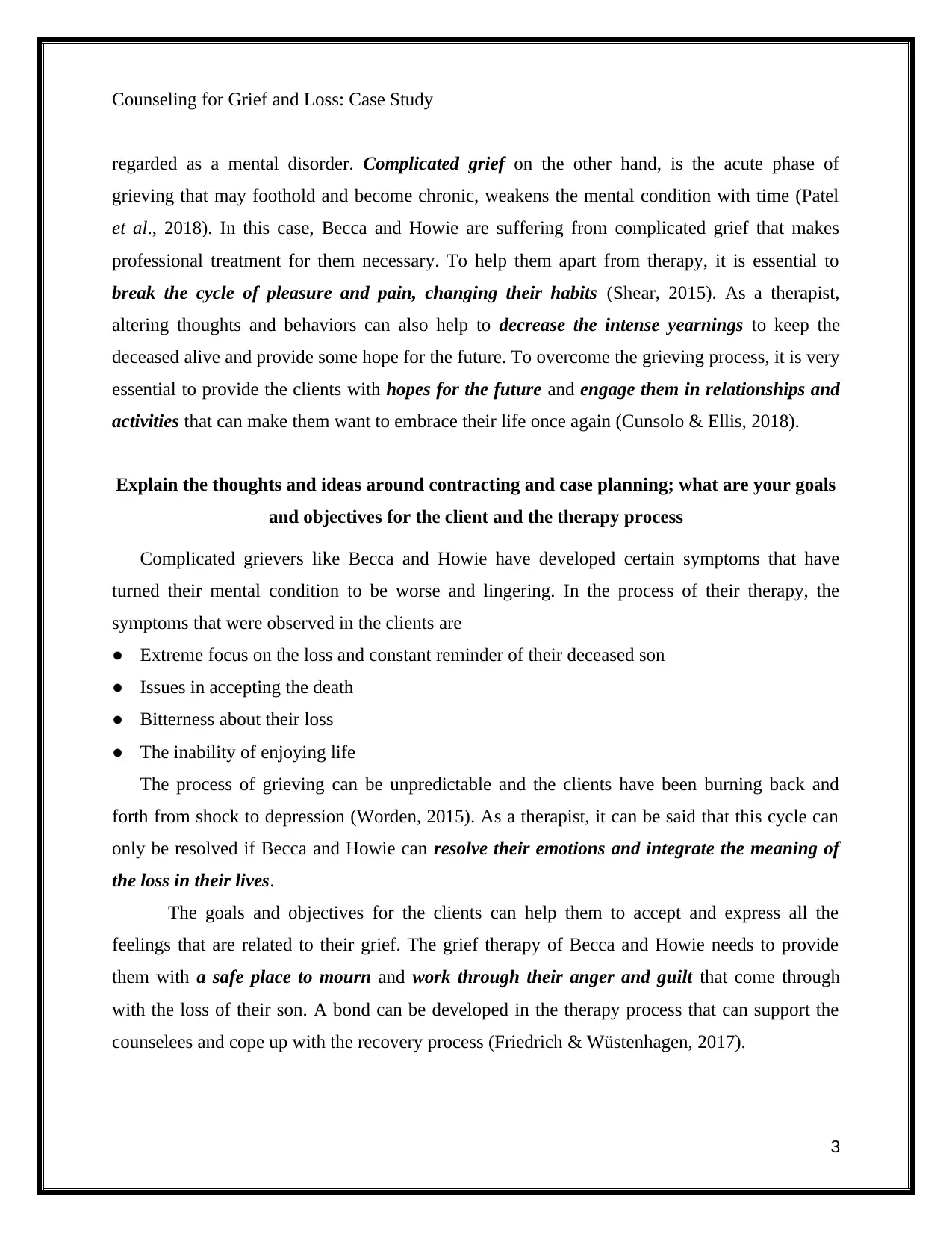
Counseling for Grief and Loss: Case Study
regarded as a mental disorder. Complicated grief on the other hand, is the acute phase of
grieving that may foothold and become chronic, weakens the mental condition with time (Patel
et al., 2018). In this case, Becca and Howie are suffering from complicated grief that makes
professional treatment for them necessary. To help them apart from therapy, it is essential to
break the cycle of pleasure and pain, changing their habits (Shear, 2015). As a therapist,
altering thoughts and behaviors can also help to decrease the intense yearnings to keep the
deceased alive and provide some hope for the future. To overcome the grieving process, it is very
essential to provide the clients with hopes for the future and engage them in relationships and
activities that can make them want to embrace their life once again (Cunsolo & Ellis, 2018).
Explain the thoughts and ideas around contracting and case planning; what are your goals
and objectives for the client and the therapy process
Complicated grievers like Becca and Howie have developed certain symptoms that have
turned their mental condition to be worse and lingering. In the process of their therapy, the
symptoms that were observed in the clients are
● Extreme focus on the loss and constant reminder of their deceased son
● Issues in accepting the death
● Bitterness about their loss
● The inability of enjoying life
The process of grieving can be unpredictable and the clients have been burning back and
forth from shock to depression (Worden, 2015). As a therapist, it can be said that this cycle can
only be resolved if Becca and Howie can resolve their emotions and integrate the meaning of
the loss in their lives.
The goals and objectives for the clients can help them to accept and express all the
feelings that are related to their grief. The grief therapy of Becca and Howie needs to provide
them with a safe place to mourn and work through their anger and guilt that come through
with the loss of their son. A bond can be developed in the therapy process that can support the
counselees and cope up with the recovery process (Friedrich & Wüstenhagen, 2017).
3
regarded as a mental disorder. Complicated grief on the other hand, is the acute phase of
grieving that may foothold and become chronic, weakens the mental condition with time (Patel
et al., 2018). In this case, Becca and Howie are suffering from complicated grief that makes
professional treatment for them necessary. To help them apart from therapy, it is essential to
break the cycle of pleasure and pain, changing their habits (Shear, 2015). As a therapist,
altering thoughts and behaviors can also help to decrease the intense yearnings to keep the
deceased alive and provide some hope for the future. To overcome the grieving process, it is very
essential to provide the clients with hopes for the future and engage them in relationships and
activities that can make them want to embrace their life once again (Cunsolo & Ellis, 2018).
Explain the thoughts and ideas around contracting and case planning; what are your goals
and objectives for the client and the therapy process
Complicated grievers like Becca and Howie have developed certain symptoms that have
turned their mental condition to be worse and lingering. In the process of their therapy, the
symptoms that were observed in the clients are
● Extreme focus on the loss and constant reminder of their deceased son
● Issues in accepting the death
● Bitterness about their loss
● The inability of enjoying life
The process of grieving can be unpredictable and the clients have been burning back and
forth from shock to depression (Worden, 2015). As a therapist, it can be said that this cycle can
only be resolved if Becca and Howie can resolve their emotions and integrate the meaning of
the loss in their lives.
The goals and objectives for the clients can help them to accept and express all the
feelings that are related to their grief. The grief therapy of Becca and Howie needs to provide
them with a safe place to mourn and work through their anger and guilt that come through
with the loss of their son. A bond can be developed in the therapy process that can support the
counselees and cope up with the recovery process (Friedrich & Wüstenhagen, 2017).
3
Paraphrase This Document
Need a fresh take? Get an instant paraphrase of this document with our AI Paraphraser
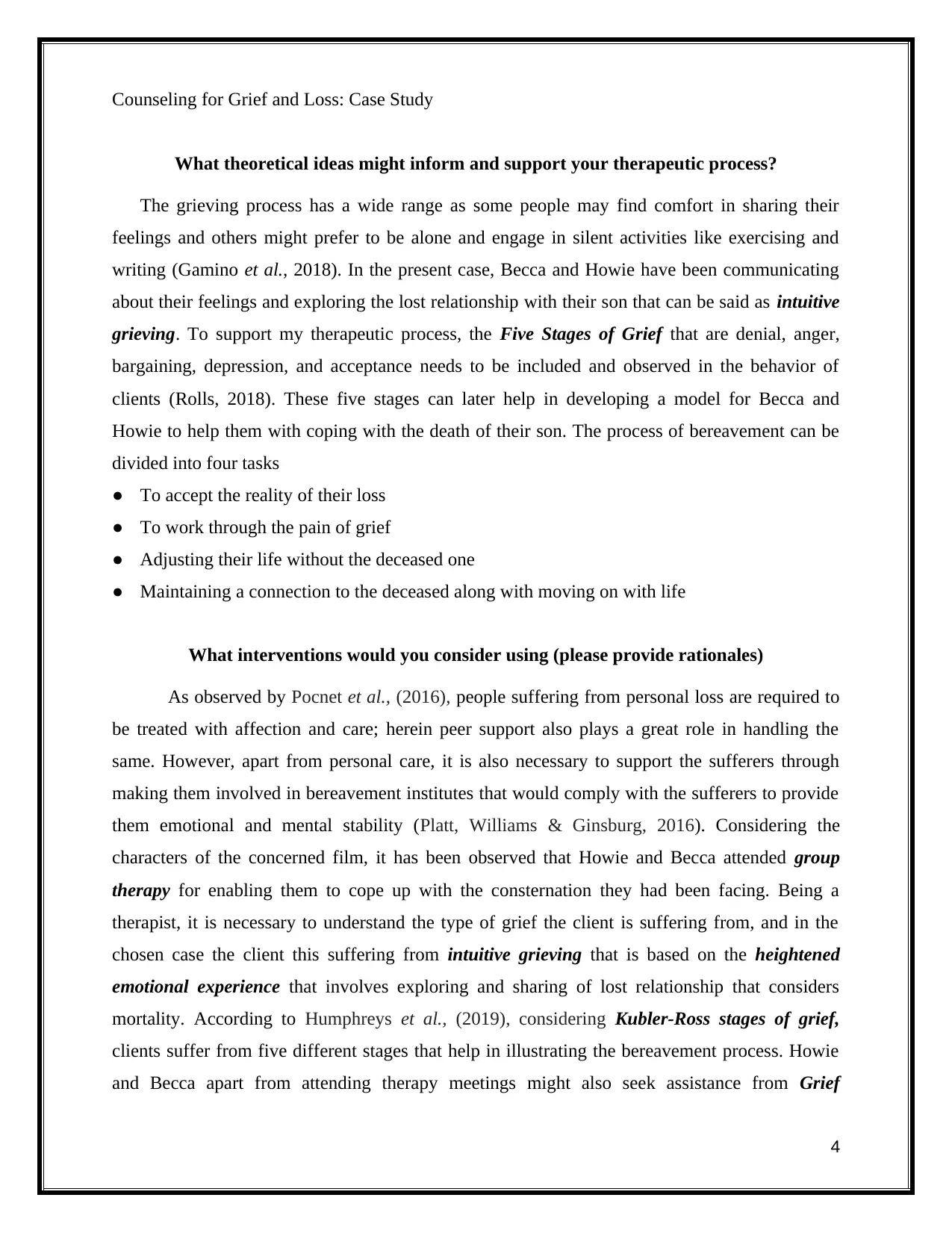
Counseling for Grief and Loss: Case Study
What theoretical ideas might inform and support your therapeutic process?
The grieving process has a wide range as some people may find comfort in sharing their
feelings and others might prefer to be alone and engage in silent activities like exercising and
writing (Gamino et al., 2018). In the present case, Becca and Howie have been communicating
about their feelings and exploring the lost relationship with their son that can be said as intuitive
grieving. To support my therapeutic process, the Five Stages of Grief that are denial, anger,
bargaining, depression, and acceptance needs to be included and observed in the behavior of
clients (Rolls, 2018). These five stages can later help in developing a model for Becca and
Howie to help them with coping with the death of their son. The process of bereavement can be
divided into four tasks
● To accept the reality of their loss
● To work through the pain of grief
● Adjusting their life without the deceased one
● Maintaining a connection to the deceased along with moving on with life
What interventions would you consider using (please provide rationales)
As observed by Pocnet et al., (2016), people suffering from personal loss are required to
be treated with affection and care; herein peer support also plays a great role in handling the
same. However, apart from personal care, it is also necessary to support the sufferers through
making them involved in bereavement institutes that would comply with the sufferers to provide
them emotional and mental stability (Platt, Williams & Ginsburg, 2016). Considering the
characters of the concerned film, it has been observed that Howie and Becca attended group
therapy for enabling them to cope up with the consternation they had been facing. Being a
therapist, it is necessary to understand the type of grief the client is suffering from, and in the
chosen case the client this suffering from intuitive grieving that is based on the heightened
emotional experience that involves exploring and sharing of lost relationship that considers
mortality. According to Humphreys et al., (2019), considering Kubler-Ross stages of grief,
clients suffer from five different stages that help in illustrating the bereavement process. Howie
and Becca apart from attending therapy meetings might also seek assistance from Grief
4
What theoretical ideas might inform and support your therapeutic process?
The grieving process has a wide range as some people may find comfort in sharing their
feelings and others might prefer to be alone and engage in silent activities like exercising and
writing (Gamino et al., 2018). In the present case, Becca and Howie have been communicating
about their feelings and exploring the lost relationship with their son that can be said as intuitive
grieving. To support my therapeutic process, the Five Stages of Grief that are denial, anger,
bargaining, depression, and acceptance needs to be included and observed in the behavior of
clients (Rolls, 2018). These five stages can later help in developing a model for Becca and
Howie to help them with coping with the death of their son. The process of bereavement can be
divided into four tasks
● To accept the reality of their loss
● To work through the pain of grief
● Adjusting their life without the deceased one
● Maintaining a connection to the deceased along with moving on with life
What interventions would you consider using (please provide rationales)
As observed by Pocnet et al., (2016), people suffering from personal loss are required to
be treated with affection and care; herein peer support also plays a great role in handling the
same. However, apart from personal care, it is also necessary to support the sufferers through
making them involved in bereavement institutes that would comply with the sufferers to provide
them emotional and mental stability (Platt, Williams & Ginsburg, 2016). Considering the
characters of the concerned film, it has been observed that Howie and Becca attended group
therapy for enabling them to cope up with the consternation they had been facing. Being a
therapist, it is necessary to understand the type of grief the client is suffering from, and in the
chosen case the client this suffering from intuitive grieving that is based on the heightened
emotional experience that involves exploring and sharing of lost relationship that considers
mortality. According to Humphreys et al., (2019), considering Kubler-Ross stages of grief,
clients suffer from five different stages that help in illustrating the bereavement process. Howie
and Becca apart from attending therapy meetings might also seek assistance from Grief
4
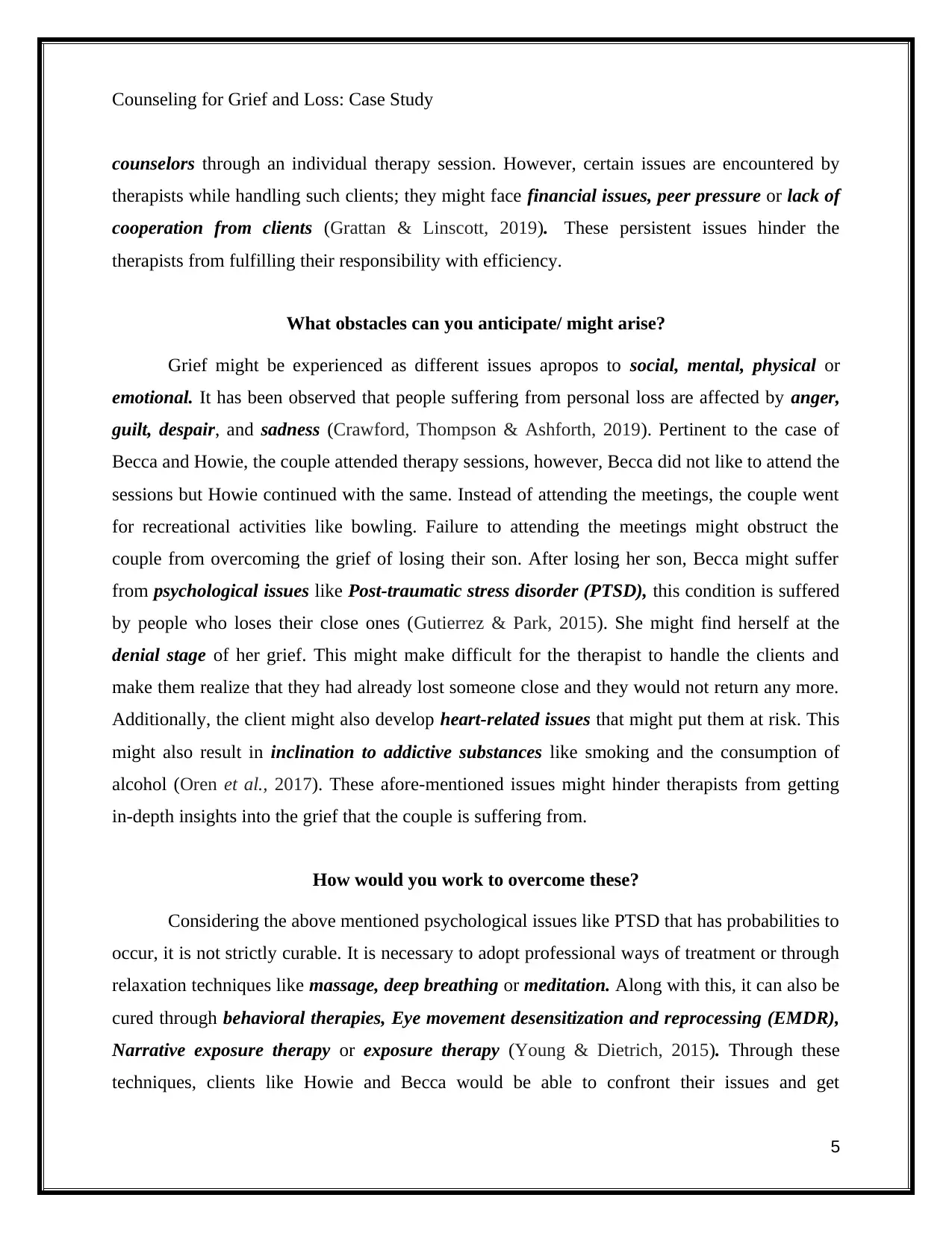
Counseling for Grief and Loss: Case Study
counselors through an individual therapy session. However, certain issues are encountered by
therapists while handling such clients; they might face financial issues, peer pressure or lack of
cooperation from clients (Grattan & Linscott, 2019). These persistent issues hinder the
therapists from fulfilling their responsibility with efficiency.
What obstacles can you anticipate/ might arise?
Grief might be experienced as different issues apropos to social, mental, physical or
emotional. It has been observed that people suffering from personal loss are affected by anger,
guilt, despair, and sadness (Crawford, Thompson & Ashforth, 2019). Pertinent to the case of
Becca and Howie, the couple attended therapy sessions, however, Becca did not like to attend the
sessions but Howie continued with the same. Instead of attending the meetings, the couple went
for recreational activities like bowling. Failure to attending the meetings might obstruct the
couple from overcoming the grief of losing their son. After losing her son, Becca might suffer
from psychological issues like Post-traumatic stress disorder (PTSD), this condition is suffered
by people who loses their close ones (Gutierrez & Park, 2015). She might find herself at the
denial stage of her grief. This might make difficult for the therapist to handle the clients and
make them realize that they had already lost someone close and they would not return any more.
Additionally, the client might also develop heart-related issues that might put them at risk. This
might also result in inclination to addictive substances like smoking and the consumption of
alcohol (Oren et al., 2017). These afore-mentioned issues might hinder therapists from getting
in-depth insights into the grief that the couple is suffering from.
How would you work to overcome these?
Considering the above mentioned psychological issues like PTSD that has probabilities to
occur, it is not strictly curable. It is necessary to adopt professional ways of treatment or through
relaxation techniques like massage, deep breathing or meditation. Along with this, it can also be
cured through behavioral therapies, Eye movement desensitization and reprocessing (EMDR),
Narrative exposure therapy or exposure therapy (Young & Dietrich, 2015). Through these
techniques, clients like Howie and Becca would be able to confront their issues and get
5
counselors through an individual therapy session. However, certain issues are encountered by
therapists while handling such clients; they might face financial issues, peer pressure or lack of
cooperation from clients (Grattan & Linscott, 2019). These persistent issues hinder the
therapists from fulfilling their responsibility with efficiency.
What obstacles can you anticipate/ might arise?
Grief might be experienced as different issues apropos to social, mental, physical or
emotional. It has been observed that people suffering from personal loss are affected by anger,
guilt, despair, and sadness (Crawford, Thompson & Ashforth, 2019). Pertinent to the case of
Becca and Howie, the couple attended therapy sessions, however, Becca did not like to attend the
sessions but Howie continued with the same. Instead of attending the meetings, the couple went
for recreational activities like bowling. Failure to attending the meetings might obstruct the
couple from overcoming the grief of losing their son. After losing her son, Becca might suffer
from psychological issues like Post-traumatic stress disorder (PTSD), this condition is suffered
by people who loses their close ones (Gutierrez & Park, 2015). She might find herself at the
denial stage of her grief. This might make difficult for the therapist to handle the clients and
make them realize that they had already lost someone close and they would not return any more.
Additionally, the client might also develop heart-related issues that might put them at risk. This
might also result in inclination to addictive substances like smoking and the consumption of
alcohol (Oren et al., 2017). These afore-mentioned issues might hinder therapists from getting
in-depth insights into the grief that the couple is suffering from.
How would you work to overcome these?
Considering the above mentioned psychological issues like PTSD that has probabilities to
occur, it is not strictly curable. It is necessary to adopt professional ways of treatment or through
relaxation techniques like massage, deep breathing or meditation. Along with this, it can also be
cured through behavioral therapies, Eye movement desensitization and reprocessing (EMDR),
Narrative exposure therapy or exposure therapy (Young & Dietrich, 2015). Through these
techniques, clients like Howie and Becca would be able to confront their issues and get
5
⊘ This is a preview!⊘
Do you want full access?
Subscribe today to unlock all pages.

Trusted by 1+ million students worldwide
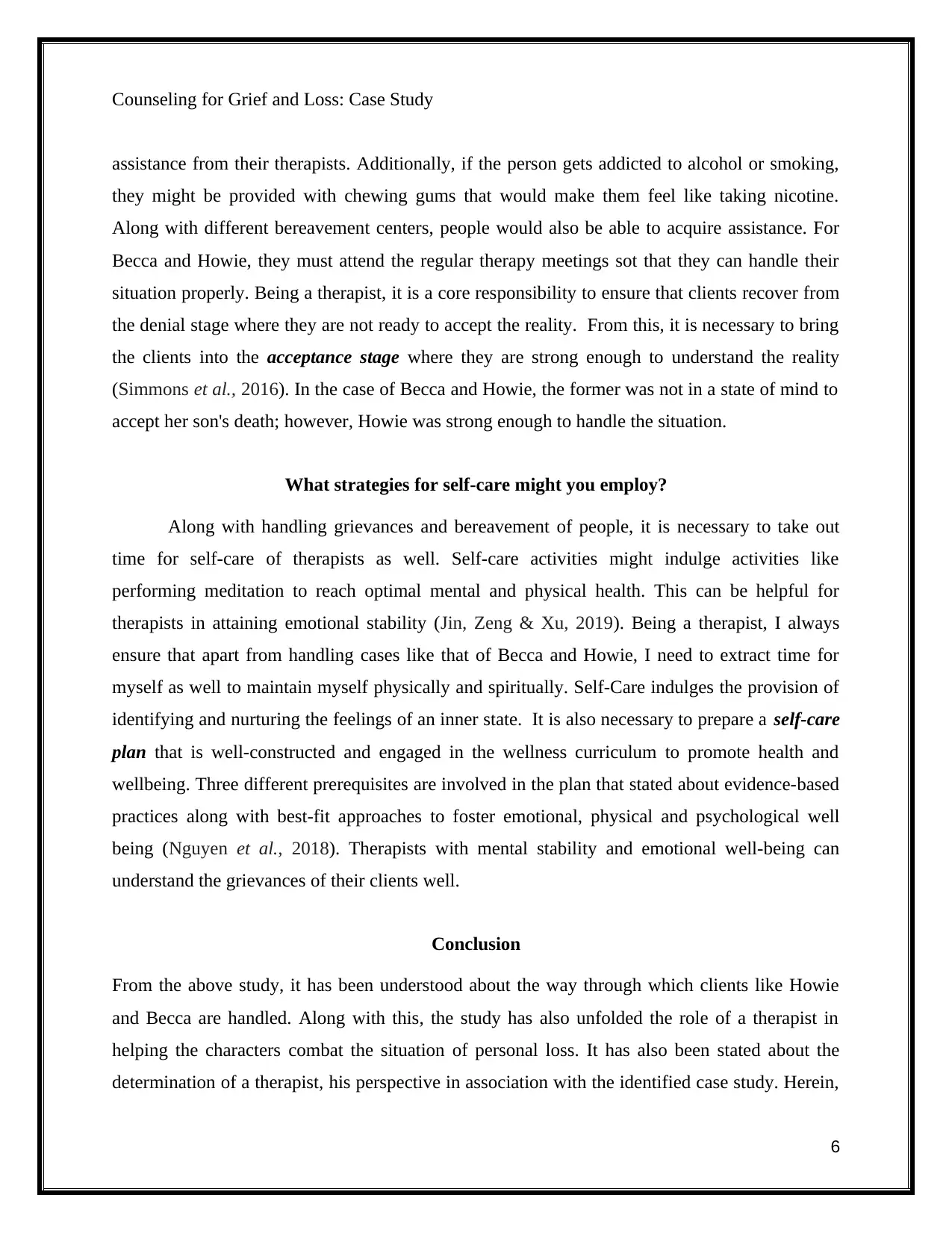
Counseling for Grief and Loss: Case Study
assistance from their therapists. Additionally, if the person gets addicted to alcohol or smoking,
they might be provided with chewing gums that would make them feel like taking nicotine.
Along with different bereavement centers, people would also be able to acquire assistance. For
Becca and Howie, they must attend the regular therapy meetings sot that they can handle their
situation properly. Being a therapist, it is a core responsibility to ensure that clients recover from
the denial stage where they are not ready to accept the reality. From this, it is necessary to bring
the clients into the acceptance stage where they are strong enough to understand the reality
(Simmons et al., 2016). In the case of Becca and Howie, the former was not in a state of mind to
accept her son's death; however, Howie was strong enough to handle the situation.
What strategies for self-care might you employ?
Along with handling grievances and bereavement of people, it is necessary to take out
time for self-care of therapists as well. Self-care activities might indulge activities like
performing meditation to reach optimal mental and physical health. This can be helpful for
therapists in attaining emotional stability (Jin, Zeng & Xu, 2019). Being a therapist, I always
ensure that apart from handling cases like that of Becca and Howie, I need to extract time for
myself as well to maintain myself physically and spiritually. Self-Care indulges the provision of
identifying and nurturing the feelings of an inner state. It is also necessary to prepare a self-care
plan that is well-constructed and engaged in the wellness curriculum to promote health and
wellbeing. Three different prerequisites are involved in the plan that stated about evidence-based
practices along with best-fit approaches to foster emotional, physical and psychological well
being (Nguyen et al., 2018). Therapists with mental stability and emotional well-being can
understand the grievances of their clients well.
Conclusion
From the above study, it has been understood about the way through which clients like Howie
and Becca are handled. Along with this, the study has also unfolded the role of a therapist in
helping the characters combat the situation of personal loss. It has also been stated about the
determination of a therapist, his perspective in association with the identified case study. Herein,
6
assistance from their therapists. Additionally, if the person gets addicted to alcohol or smoking,
they might be provided with chewing gums that would make them feel like taking nicotine.
Along with different bereavement centers, people would also be able to acquire assistance. For
Becca and Howie, they must attend the regular therapy meetings sot that they can handle their
situation properly. Being a therapist, it is a core responsibility to ensure that clients recover from
the denial stage where they are not ready to accept the reality. From this, it is necessary to bring
the clients into the acceptance stage where they are strong enough to understand the reality
(Simmons et al., 2016). In the case of Becca and Howie, the former was not in a state of mind to
accept her son's death; however, Howie was strong enough to handle the situation.
What strategies for self-care might you employ?
Along with handling grievances and bereavement of people, it is necessary to take out
time for self-care of therapists as well. Self-care activities might indulge activities like
performing meditation to reach optimal mental and physical health. This can be helpful for
therapists in attaining emotional stability (Jin, Zeng & Xu, 2019). Being a therapist, I always
ensure that apart from handling cases like that of Becca and Howie, I need to extract time for
myself as well to maintain myself physically and spiritually. Self-Care indulges the provision of
identifying and nurturing the feelings of an inner state. It is also necessary to prepare a self-care
plan that is well-constructed and engaged in the wellness curriculum to promote health and
wellbeing. Three different prerequisites are involved in the plan that stated about evidence-based
practices along with best-fit approaches to foster emotional, physical and psychological well
being (Nguyen et al., 2018). Therapists with mental stability and emotional well-being can
understand the grievances of their clients well.
Conclusion
From the above study, it has been understood about the way through which clients like Howie
and Becca are handled. Along with this, the study has also unfolded the role of a therapist in
helping the characters combat the situation of personal loss. It has also been stated about the
determination of a therapist, his perspective in association with the identified case study. Herein,
6
Paraphrase This Document
Need a fresh take? Get an instant paraphrase of this document with our AI Paraphraser
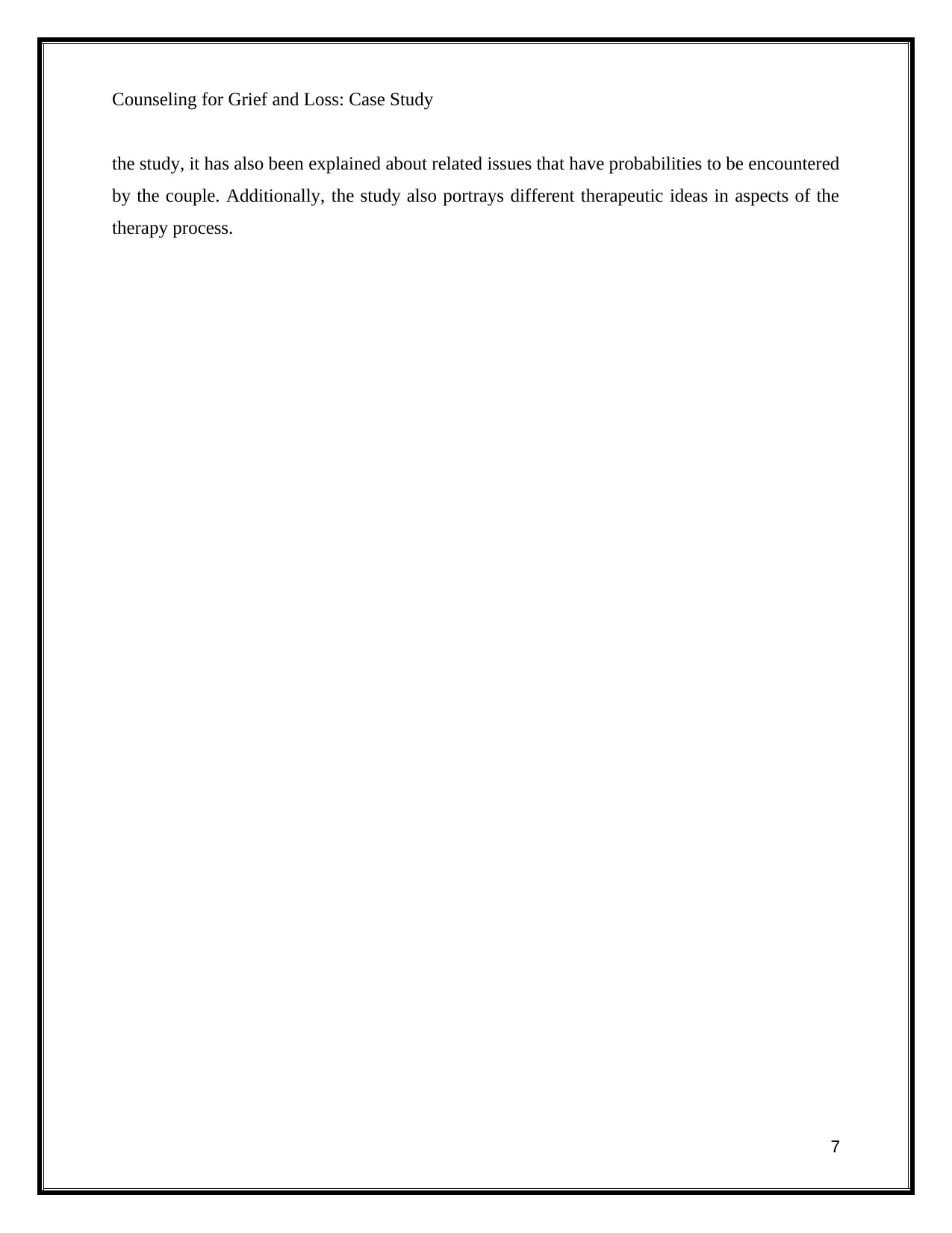
Counseling for Grief and Loss: Case Study
the study, it has also been explained about related issues that have probabilities to be encountered
by the couple. Additionally, the study also portrays different therapeutic ideas in aspects of the
therapy process.
7
the study, it has also been explained about related issues that have probabilities to be encountered
by the couple. Additionally, the study also portrays different therapeutic ideas in aspects of the
therapy process.
7
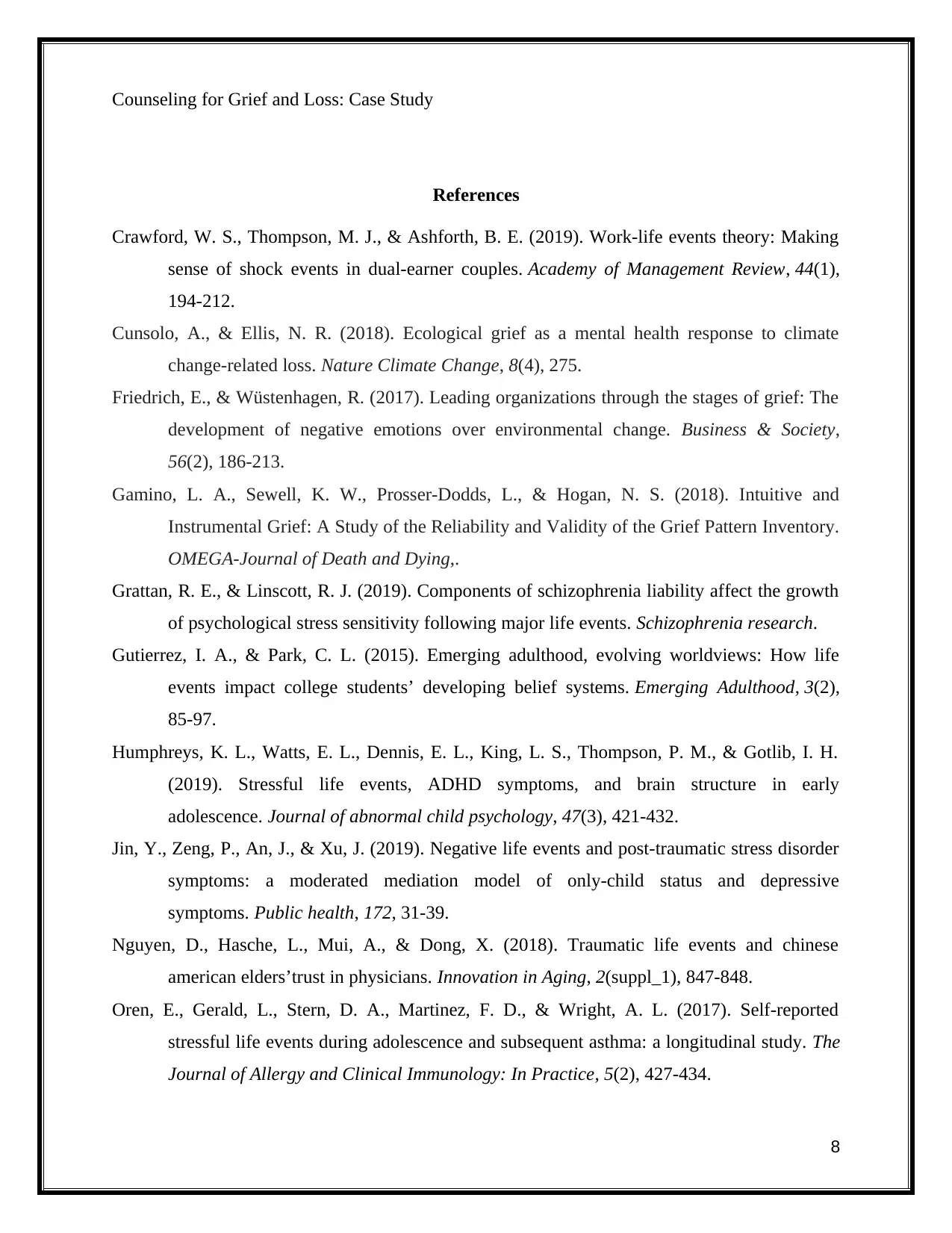
Counseling for Grief and Loss: Case Study
References
Crawford, W. S., Thompson, M. J., & Ashforth, B. E. (2019). Work-life events theory: Making
sense of shock events in dual-earner couples. Academy of Management Review, 44(1),
194-212.
Cunsolo, A., & Ellis, N. R. (2018). Ecological grief as a mental health response to climate
change-related loss. Nature Climate Change, 8(4), 275.
Friedrich, E., & Wüstenhagen, R. (2017). Leading organizations through the stages of grief: The
development of negative emotions over environmental change. Business & Society,
56(2), 186-213.
Gamino, L. A., Sewell, K. W., Prosser-Dodds, L., & Hogan, N. S. (2018). Intuitive and
Instrumental Grief: A Study of the Reliability and Validity of the Grief Pattern Inventory.
OMEGA-Journal of Death and Dying,.
Grattan, R. E., & Linscott, R. J. (2019). Components of schizophrenia liability affect the growth
of psychological stress sensitivity following major life events. Schizophrenia research.
Gutierrez, I. A., & Park, C. L. (2015). Emerging adulthood, evolving worldviews: How life
events impact college students’ developing belief systems. Emerging Adulthood, 3(2),
85-97.
Humphreys, K. L., Watts, E. L., Dennis, E. L., King, L. S., Thompson, P. M., & Gotlib, I. H.
(2019). Stressful life events, ADHD symptoms, and brain structure in early
adolescence. Journal of abnormal child psychology, 47(3), 421-432.
Jin, Y., Zeng, P., An, J., & Xu, J. (2019). Negative life events and post-traumatic stress disorder
symptoms: a moderated mediation model of only-child status and depressive
symptoms. Public health, 172, 31-39.
Nguyen, D., Hasche, L., Mui, A., & Dong, X. (2018). Traumatic life events and chinese
american elders’trust in physicians. Innovation in Aging, 2(suppl_1), 847-848.
Oren, E., Gerald, L., Stern, D. A., Martinez, F. D., & Wright, A. L. (2017). Self-reported
stressful life events during adolescence and subsequent asthma: a longitudinal study. The
Journal of Allergy and Clinical Immunology: In Practice, 5(2), 427-434.
8
References
Crawford, W. S., Thompson, M. J., & Ashforth, B. E. (2019). Work-life events theory: Making
sense of shock events in dual-earner couples. Academy of Management Review, 44(1),
194-212.
Cunsolo, A., & Ellis, N. R. (2018). Ecological grief as a mental health response to climate
change-related loss. Nature Climate Change, 8(4), 275.
Friedrich, E., & Wüstenhagen, R. (2017). Leading organizations through the stages of grief: The
development of negative emotions over environmental change. Business & Society,
56(2), 186-213.
Gamino, L. A., Sewell, K. W., Prosser-Dodds, L., & Hogan, N. S. (2018). Intuitive and
Instrumental Grief: A Study of the Reliability and Validity of the Grief Pattern Inventory.
OMEGA-Journal of Death and Dying,.
Grattan, R. E., & Linscott, R. J. (2019). Components of schizophrenia liability affect the growth
of psychological stress sensitivity following major life events. Schizophrenia research.
Gutierrez, I. A., & Park, C. L. (2015). Emerging adulthood, evolving worldviews: How life
events impact college students’ developing belief systems. Emerging Adulthood, 3(2),
85-97.
Humphreys, K. L., Watts, E. L., Dennis, E. L., King, L. S., Thompson, P. M., & Gotlib, I. H.
(2019). Stressful life events, ADHD symptoms, and brain structure in early
adolescence. Journal of abnormal child psychology, 47(3), 421-432.
Jin, Y., Zeng, P., An, J., & Xu, J. (2019). Negative life events and post-traumatic stress disorder
symptoms: a moderated mediation model of only-child status and depressive
symptoms. Public health, 172, 31-39.
Nguyen, D., Hasche, L., Mui, A., & Dong, X. (2018). Traumatic life events and chinese
american elders’trust in physicians. Innovation in Aging, 2(suppl_1), 847-848.
Oren, E., Gerald, L., Stern, D. A., Martinez, F. D., & Wright, A. L. (2017). Self-reported
stressful life events during adolescence and subsequent asthma: a longitudinal study. The
Journal of Allergy and Clinical Immunology: In Practice, 5(2), 427-434.
8
⊘ This is a preview!⊘
Do you want full access?
Subscribe today to unlock all pages.

Trusted by 1+ million students worldwide
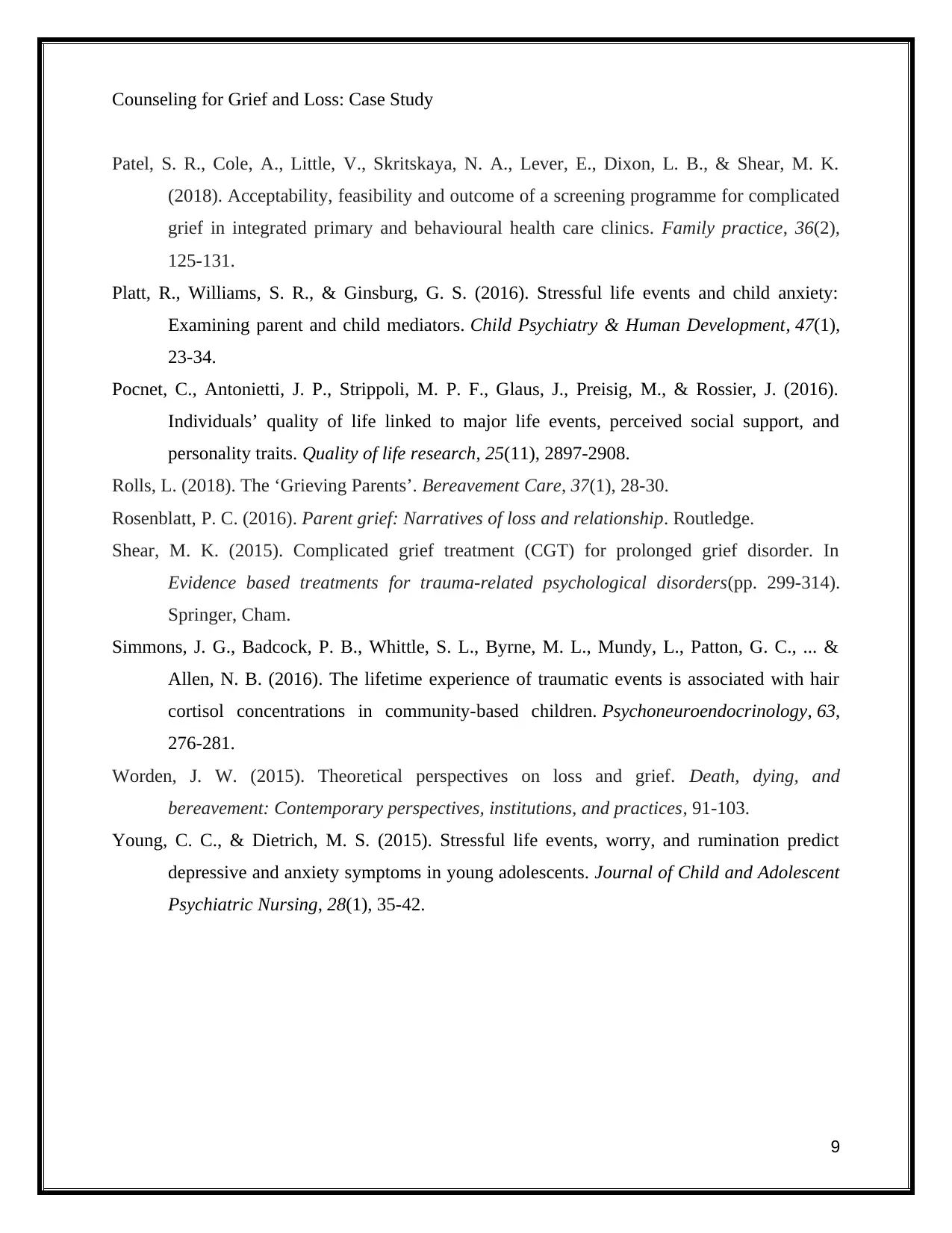
Counseling for Grief and Loss: Case Study
Patel, S. R., Cole, A., Little, V., Skritskaya, N. A., Lever, E., Dixon, L. B., & Shear, M. K.
(2018). Acceptability, feasibility and outcome of a screening programme for complicated
grief in integrated primary and behavioural health care clinics. Family practice, 36(2),
125-131.
Platt, R., Williams, S. R., & Ginsburg, G. S. (2016). Stressful life events and child anxiety:
Examining parent and child mediators. Child Psychiatry & Human Development, 47(1),
23-34.
Pocnet, C., Antonietti, J. P., Strippoli, M. P. F., Glaus, J., Preisig, M., & Rossier, J. (2016).
Individuals’ quality of life linked to major life events, perceived social support, and
personality traits. Quality of life research, 25(11), 2897-2908.
Rolls, L. (2018). The ‘Grieving Parents’. Bereavement Care, 37(1), 28-30.
Rosenblatt, P. C. (2016). Parent grief: Narratives of loss and relationship. Routledge.
Shear, M. K. (2015). Complicated grief treatment (CGT) for prolonged grief disorder. In
Evidence based treatments for trauma-related psychological disorders(pp. 299-314).
Springer, Cham.
Simmons, J. G., Badcock, P. B., Whittle, S. L., Byrne, M. L., Mundy, L., Patton, G. C., ... &
Allen, N. B. (2016). The lifetime experience of traumatic events is associated with hair
cortisol concentrations in community-based children. Psychoneuroendocrinology, 63,
276-281.
Worden, J. W. (2015). Theoretical perspectives on loss and grief. Death, dying, and
bereavement: Contemporary perspectives, institutions, and practices, 91-103.
Young, C. C., & Dietrich, M. S. (2015). Stressful life events, worry, and rumination predict
depressive and anxiety symptoms in young adolescents. Journal of Child and Adolescent
Psychiatric Nursing, 28(1), 35-42.
9
Patel, S. R., Cole, A., Little, V., Skritskaya, N. A., Lever, E., Dixon, L. B., & Shear, M. K.
(2018). Acceptability, feasibility and outcome of a screening programme for complicated
grief in integrated primary and behavioural health care clinics. Family practice, 36(2),
125-131.
Platt, R., Williams, S. R., & Ginsburg, G. S. (2016). Stressful life events and child anxiety:
Examining parent and child mediators. Child Psychiatry & Human Development, 47(1),
23-34.
Pocnet, C., Antonietti, J. P., Strippoli, M. P. F., Glaus, J., Preisig, M., & Rossier, J. (2016).
Individuals’ quality of life linked to major life events, perceived social support, and
personality traits. Quality of life research, 25(11), 2897-2908.
Rolls, L. (2018). The ‘Grieving Parents’. Bereavement Care, 37(1), 28-30.
Rosenblatt, P. C. (2016). Parent grief: Narratives of loss and relationship. Routledge.
Shear, M. K. (2015). Complicated grief treatment (CGT) for prolonged grief disorder. In
Evidence based treatments for trauma-related psychological disorders(pp. 299-314).
Springer, Cham.
Simmons, J. G., Badcock, P. B., Whittle, S. L., Byrne, M. L., Mundy, L., Patton, G. C., ... &
Allen, N. B. (2016). The lifetime experience of traumatic events is associated with hair
cortisol concentrations in community-based children. Psychoneuroendocrinology, 63,
276-281.
Worden, J. W. (2015). Theoretical perspectives on loss and grief. Death, dying, and
bereavement: Contemporary perspectives, institutions, and practices, 91-103.
Young, C. C., & Dietrich, M. S. (2015). Stressful life events, worry, and rumination predict
depressive and anxiety symptoms in young adolescents. Journal of Child and Adolescent
Psychiatric Nursing, 28(1), 35-42.
9
1 out of 10
Related Documents
Your All-in-One AI-Powered Toolkit for Academic Success.
+13062052269
info@desklib.com
Available 24*7 on WhatsApp / Email
![[object Object]](/_next/static/media/star-bottom.7253800d.svg)
Unlock your academic potential
Copyright © 2020–2026 A2Z Services. All Rights Reserved. Developed and managed by ZUCOL.





